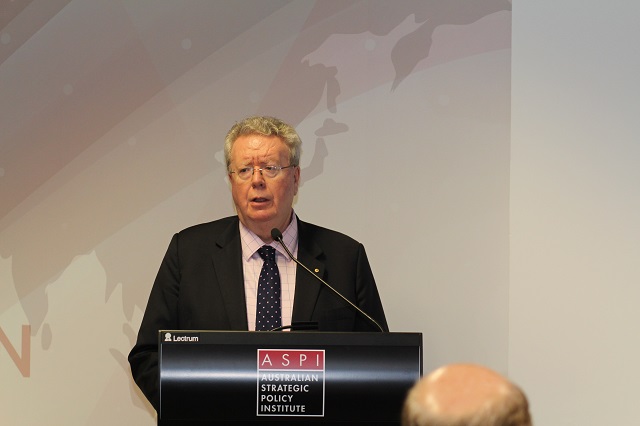ASPI at 15: past, present and future
There’s a Chinese perspective that holds there are two kinds of time. Looking back is far more valuable than looking ahead, for it’s by looking back that lessons are understood and appropriate conclusions drawn. So it is with ASPI.
The creation of ASPI in 2001 by the Howard government, with the support of Kim Beazley’s Labor Opposition, represents a rare Canberra decision.
Not only has ASPI met expectations, it has consistently exceeded them. Centring the policy debate in defence and national security, crafting intelligent and effective policy options, and reaching out to Australians interested in strategic policy, ASPI has achieved a record of influential contributions while not losing its understood need for objectivity and balance.
ASPI may occasionally have annoyed defence ministers, on both sides of the aisle. But that reflects an essential core of the Institute’s brief: to contest advice to government and to promote active debate on the issues.
Even the most aggrieved defence minister over the years would stop well short of accusing ASPI of partisan positions. It’s been singularly free of such behaviour and its reputation and relations with Parliament confirm this continuing reality, which has characterised its first 15 years.
Much of the credit for ASPI’s success should be shared deservedly among its leaders: Chairs Bob O’Neill and Mark Johnson and Executive Directors Hugh White, Peter Abigail and Peter Jennings. Peter Jennings, in particular, has built upon solid foundations to guide ASPI into new dimensions: from authoritative policy conferences; to closer relations with business and industry; to becoming the accepted policy engine on issues ranging from budgeting through cyber security to submarines; while being a dominant voice on national security in the public arena.
Prime Minister John Howard was determined to make ASPI bipartisan, just as the Community Consultation process for the 2001 Defence White Paper (and subsequently the 2009 document) had been. To that end, he asked Kim Beazley to nominate a representative, who turned out to be me.
During the ensuing 15 years, I represented Kim Beazley, Simon Crean, Beazley (again), Mark Latham, then Prime Ministers Kevin Rudd and Julia Gillard and, finally, Bill Shorten. The standing joke at ASPI became that I’d survived more purges in the ALP leadership than a member of Stalin’s Politburo in Moscow in 1937.
The ASPI Chairmanship was a great honour, confirmed by Kevin Rudd on then defence minister, Joel Fitzgibbon’s recommendation, and subsequently reaffirmed by Stephen Smith. Both Julia Gillard and Tony Abbott were content to see me serve.
The point about the above is that I was privileged to be present at the creation of ASPI and have watched its astounding growth and extraordinary success.
It wasn’t always a rose garden. There were elements in the Defence Department bureaucracy who wanted ASPI shut down and for a while this appeared probable. Peter Abigail was outstanding in adversity and eventually we emerged intact.
This isn’t to claim that ASPI hasn’t made mistakes. The Institute has been guilty of speculative commentary in earlier days, for example. But those days are long gone and the current crop of ASPI researchers and analysts are among the most able found anywhere. This statement is validated by ASPI repeatedly being numbered among the best ‘think tanks’ in the world.
Part of the reason is that ASPI has attracted intellectual capital of a high order, people who are accomplished in their fields. ASPI Councils, often comprised of very gifted individuals, have supported innovative programs and exchanges, backed original research endeavours and encouraged a spirit of enquiry. Excellence is routinely the goal.
What’s next for ASPI?
Given its aspirations and levels of support beyond Defence, consideration should now be given to changing the ASPI model. Severing the formal tie with Defence, while retaining research and resource links, should be on the structural agenda. The RAND model beckons, with an independent board, reputational excellence for scholarship, strong private sector links and challenging briefs from both government and non-government sectors.
For ASPI to grow in its second 15 years and to cast its policy influence well beyond Australian shores, a new ASPI configuration is needed.
